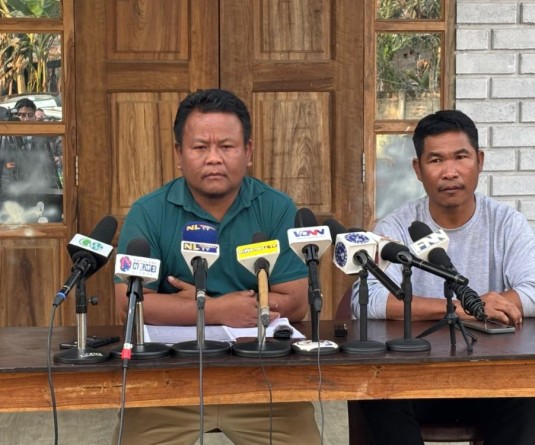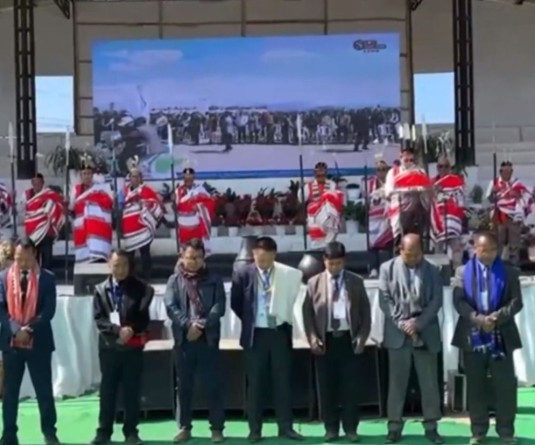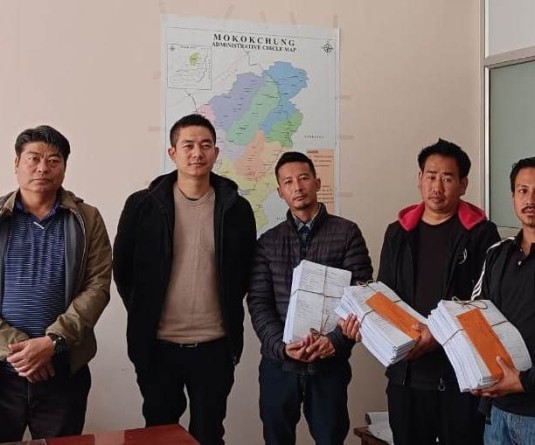
MP Tokheho makes push for oil exploration in Nagaland
Dimapur, September 15 (MExN): Nagaland’s MP to the Lok Sabha Tokheho Yepthomi on Wednesday said that unless the Government of Nagaland and the Naga people are “flexible” with the issue of Article 371 (A) of the Indian Constitution, “Nagas will always be dependent on the Central Government for our barest of sustenance.”
Attributing the state’s ‘revenue crunch’ to its people, the MP, in a press statement, opined that the state needs to “take cognizance of the merits and demerits of Article 371 (A), which has been both a boon and bane for development activities in our state.”
According to Yepthomi, despite 58 years as a state under the Union of India, the Nagaland government is still “heavily dependent on funds from central assistance,” and even with a 90:10 ratio of Central and State share, the state is still unable to meet its economic requirements for development activities.
In this regard, he cited the example of the energy sector and said that while the state has numerous avenues to harness energy for generation of electricity; hindrances created due to land owner issues have cost the state dearly. As a result, he said, “The energy sector is perhaps the largest contributor to the deficit in our state budget.”
To drive the point home, the MP made a comparison on the revenue that is being generated through extraction of oil in the neighbouring state of Assam and said that despite being blessed with abundance of natural resources, Nagaland is “choosing to forego such blessings.”
He said that the Oil and Natural Gas Corporation (ONGC) was given permission in 1973 for survey and investigation in Nagaland and in between 1981 to 1994 the state government was given oil royalty of Rs 33.3 crore. Drilling sites at Changpang, Hozukhe on the bank of Zubza River, Khopanala and Toshezu were done and ready for extraction; however, “the infrastructure and seamless pipes which were created by the ONGC were destroyed and stolen on the grounds that oil and its resources would be utilized after getting sovereignty and to enforce Article 371 (A),” Yepthomi stated.
Whilst Nagaland stopped extraction of oil owing to various reasons the ONGC has continued drilling in Assam and has already completed 39 oil fields of which 27 are operational. The Government of Assam has collected Rs 17995.83 crore in the last ten years (2011-2021) whereas, Nagaland is losing approximately Rs 5 crore daily or Rs 1825 crore annually, he underscored.
Yepthomi also informed that the Geleki, Khoraghat, Nambar, Kasomarigaon, Suphyam, Dayalpur, Barholla and Mekrang oil fields are within the Assam-Nagaland border and the royalty for these are only being collected by the State of Assam. Of the listed 39 oilfields, Changlang and Khasam are between Assam and Arunachal; Churachandpur is between Assam and Manipur and barring these 3 oil fields, the remaining 36 oilfields are between Assam and Nagaland border. Even within Nagaland the ONGC continued to explore oil at Pihekhu, Tokishe and Nikihe under Niuland Sub-division and drilling has already commenced at Karbi Anglong areas which are parallel to Dhansripar sub-division and Peren district, he added.
Further, the MP underscored that India imports 84% of its oil making it the third largest importer of oil in the world and the Government of India is spending a colossal amount on oil imports amounting to 111.9 billion US Dollars for 2018-19 and 101.4 billion USD for 2019-20.
In this context, Yepthomi said that Nagaland, with its vast natural resources, is forgoing huge amounts of revenue even as the Government of India is vigorously engaging in domestic oil exploration and extraction. Without being ‘flexible’ on the issue of Article 371 (A), he said, the past 58 years of statehood “has only proven that Nagaland State cannot bring oil companies on its own to operate oilfields nor sell a drop of oil as long as were a part of the Indian Union.” India along with the global economy is moving away from fossil fuels to clean renewable energy, he said, adding that “Nagaland’s oil resources will count for nothing when clean renewable energy will be cheaper than fossil fuels in the very near future.”






